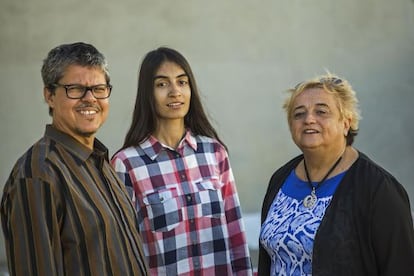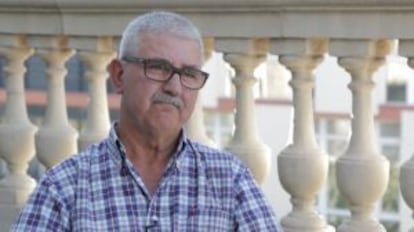The “other Catalans” who will be making their vote count this Sunday
Residents born in other parts of Spain or in other countries are divided over independence


When the seminal book Els altres catalans (The Other Catalans) first came out in 1964, it opened up a debate on the integration of immigrants from other parts of Spain. At the time, thousands of people were moving to Catalonia from poor areas in Andalusia and Extremadura, in search of jobs and better living conditions.
The book became a bestseller and was even hailed by some Catalan nationalists, who admitted that Catalans born outside the region’s borders would play an increasingly larger role in society in the coming years.
We will end up divided, and Catalonia does not deserve that”
Paco Grande, Andalusian who lives in Catalonia
Today, those “other Catalans” are not just people who were born in other parts of Spain, but also many who were born in other countries. Together, they represent around a third of the total population of Catalonia, or 2.6 million out of 7.5 million.
All the political parties know they will be a decisive factor in Sunday’s elections, which are being cast by secessionists as a make-or-break vote on independence.
Around 1.6 million “other Catalans” have the right to vote, including 293,012 individuals who were born in other countries but have since acquired Spanish citizenship.
Aware that every vote will count, political campaigns have taken them into account more than ever.
For one thing, the Diada demonstration of September 11 was held on Meridiana Avenue, an area with historical ties to Spanish immigration from the 1960s. The pro-independence association Catalan National Assembly (ANC), which has been especially active in its outreach work, specifically wanted to bring its message “to a section of the population that needs to be reached.”
Two other associations have been working hard to convince these non-native Catalans that secession from Spain is their best option.
Súmate, headed by Eduardo Reyes – an Andalusian from Córdoba – brings together Spanish speakers from other parts of Spain who, for one reason or another, favor Catalan independence. And Sí amb nosaltres, run by Uruguay native Ana Surra, does the same with immigrants from other parts of the world.
Meanwhile, anti-secession parties from the left and right of the political spectrum have also turned to immigrants to seek their vote – including the conservative Popular Party (PP), the Socialist Party and Catalunya Sí que es Pot, a leftist coalition that includes the anti-austerity party Podemos.

A study conducted two years ago for the Catalan government showed that 25.6 percent of immigrants supported independence for Catalonia, while 43.2 percent wanted to keep things the way they are and nine percent defended a third way based on greater self-rule.
Flavio Carvalho is from Brazil and works at his country’s consulate in Barcelona. He arrived in Spain 10 years ago, when the only thing he knew about the Catalan capital was that Freddie Mercury and Montserrat Caballé sang a song together there for the 1992 Olympic Games.
Carvalho is a member of Sí amb nosaltres and an advocate of Catalan independence. Like many other immigrants, he talks about the “great” feeling of participating in the creation of a new country, and being a first-class citizen from day one.
The ANC, the most active secessionist group in Catalonia, has promised them that it will be so, and has even gone so far as to promise that undocumented migrants would get their papers in a new Catalan state.
“We’ve reached a point of no return,” says Carvalho. “I am very optimistic about the process – I don’t see it as a problem but as a solution.”
I am very optimistic about the process, I don’t see it as a problem but as a solution”
Flavio Carvalho, Brazilian supporter of independence
To pro-independence immigrants, the risk of getting ejected from the European Union is not that dramatic. Annely Gagliardo, a 22-year-old chemistry student from Uruguay, says that “there are many countries outside the EU and they are very happy, like Switzerland. I don’t feel European, Europe does not represent me. I think it’s horrible what they’re doing with the refugees. We’re only European when we have money.”
But things look very different to some other foreign-born residents with the right to vote. William Arellano Rodríguez, a native of Venezuela, arrived in Barcelona 12 years ago and has since acquired Spanish citizenship. He works as a computer engineer by day and as a spinning instructor at a gym by night.
Rodríguez does see risks in exiting the EU, and has trouble understanding why others would want to secede from the homeland. Also, he is worried about pensions and about the large traded companies that might decide to leave if independence is declared.
“Where will all the money I’ve been contributing these 12 years go?” he wonders.
Among the non-Catalan Spaniards who will be voting on Sunday, the Andalusians make up the largest contingent by far. Paco Grande, who arrived in Barcelona from Córdoba 44 years ago, is one of them.
With all the government corruption, both in Madrid and here, my blinkers are off. Now I am neutral or almost against the process”
Like most people interviewed for this story, he agrees that Catalonia is getting a raw deal from a financial viewpoint and that more dialogue could be a good thing. But he rejects the independence plan and fears for the social wounds it could create.
“I am worried because this is dividing Catalan society. I’ve never had any problems here, I don’t speak Catalan but nothing ever happened. But now I am worried that there are people who are afraid to express what they think. And that’s a step backwards. I don’t care if the results are 60 to 40. We will end up divided, and Catalonia does not deserve that.”
And then again there are those who have gone through several phases in their feelings about independence.
A case in point is Heber Arcos, a Peruvian, and his wife Sandra Olivo, from Ecuador. Arcos arrived in Barcelona right after the 1992 Games and began espousing secessionist ideas.
“At first, independence sounded like paradise, just like they’re painting it now...” he recalls. “I liked the idea of creating a country like Andorra, with more jobs, a better economy...But now, with all the government corruption, both in Madrid and here, my blinkers are off. Now I am neutral or almost against the process [of independence]. I think it’s all about serving their own interests.”
English version by Susana Urra
Tu suscripción se está usando en otro dispositivo
¿Quieres añadir otro usuario a tu suscripción?
Si continúas leyendo en este dispositivo, no se podrá leer en el otro.
FlechaTu suscripción se está usando en otro dispositivo y solo puedes acceder a EL PAÍS desde un dispositivo a la vez.
Si quieres compartir tu cuenta, cambia tu suscripción a la modalidad Premium, así podrás añadir otro usuario. Cada uno accederá con su propia cuenta de email, lo que os permitirá personalizar vuestra experiencia en EL PAÍS.
En el caso de no saber quién está usando tu cuenta, te recomendamos cambiar tu contraseña aquí.
Si decides continuar compartiendo tu cuenta, este mensaje se mostrará en tu dispositivo y en el de la otra persona que está usando tu cuenta de forma indefinida, afectando a tu experiencia de lectura. Puedes consultar aquí los términos y condiciones de la suscripción digital.








































